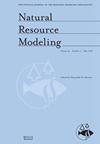To tip or not to tip: The Window of Tipping Point Analysis for social‐ecological systems
IF 2.1
4区 环境科学与生态学
Q3 ENVIRONMENTAL SCIENCES
引用次数: 3
Abstract
We introduce six steps to define a “Window of Tipping Point Analysis” which serves as a framework to increase the understanding of processes and tipping points in social‐ecological systems. We apply the Window of Tipping Point Analysis to a mathematical model and two case studies (i.e., Baltic Sea and the Humboldt Current Upwelling system), focusing on three aspects. In “to tip or be tipped” we look at agency in preventing (or driving) tipping. In “to be tipped or not to be tipped” we discuss intertemporal developments and chosen time periods for delineating regime shifts. In “to tip or not to tip” we discuss the desirability of states and their relation to the elements included. We argue that agency in tipping‐point management, the occurrence of tipping points, and desirable states depend on the window chosen for the analysis.给小费还是不给:社会生态系统的临界点分析窗口
我们介绍了六个步骤来定义“临界点分析窗口”,作为一个框架来增加对社会生态系统过程和临界点的理解。我们将临界点窗口分析应用于一个数学模型和两个案例研究(即波罗的海和洪堡流上升流系统),重点关注三个方面。在“给小费还是被小费”一节中,我们关注的是防止(或驱使)给小费的机构。在“得到小费或不得到小费”中,我们讨论了跨期发展和描述政权转移的选择时间段。在“给小费还是不给小费”中,我们讨论了状态的可取性及其与所包含元素的关系。我们认为临界点管理中的代理、临界点的发生和理想状态取决于为分析选择的窗口。
本文章由计算机程序翻译,如有差异,请以英文原文为准。
求助全文
约1分钟内获得全文
求助全文
来源期刊

Natural Resource Modeling
环境科学-环境科学
CiteScore
3.50
自引率
6.20%
发文量
28
审稿时长
>36 weeks
期刊介绍:
Natural Resource Modeling is an international journal devoted to mathematical modeling of natural resource systems. It reflects the conceptual and methodological core that is common to model building throughout disciplines including such fields as forestry, fisheries, economics and ecology. This core draws upon the analytical and methodological apparatus of mathematics, statistics, and scientific computing.
 求助内容:
求助内容: 应助结果提醒方式:
应助结果提醒方式:


